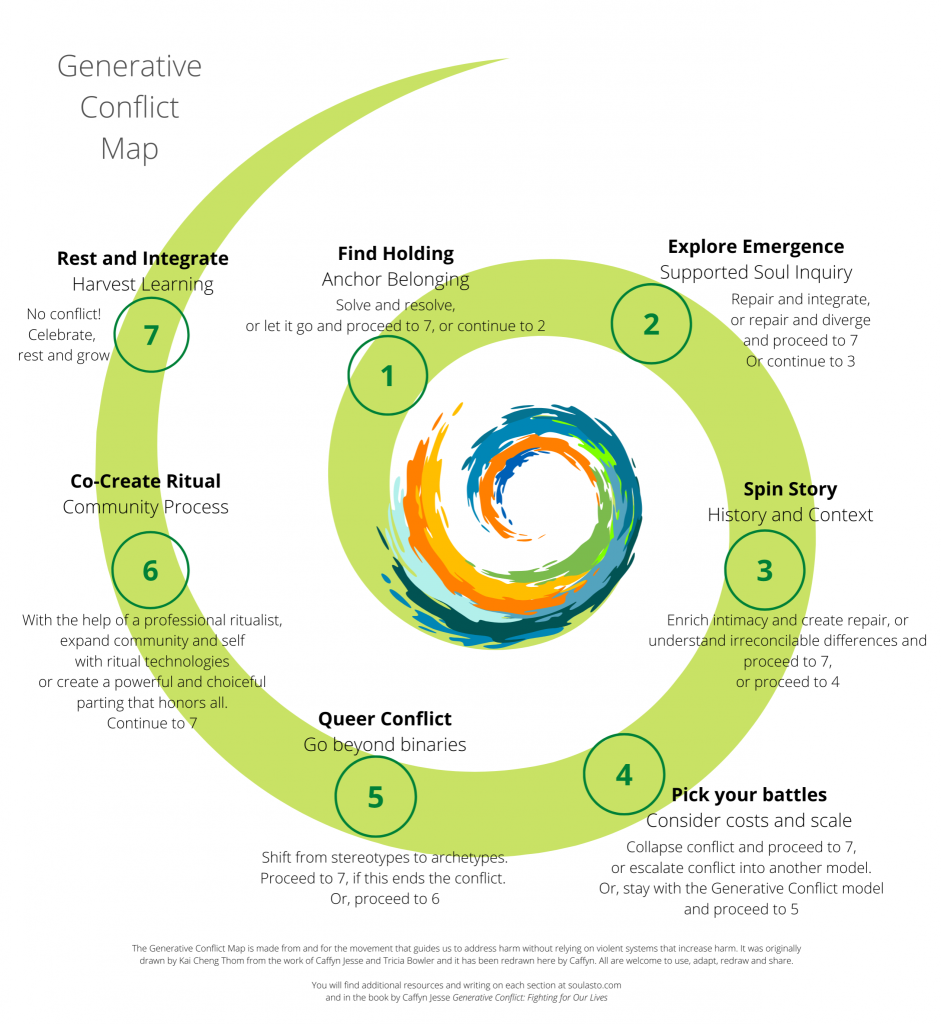Step 1 Step 2 Step 3 Step 4 Step 5 Step 6 Step 7
 When we feel danger, we are not neurologically resourced for creative engagement. Some kind of map is needed, to guide us in engaging in conflict in generative ways, while valuing empowered choice and voice, courage, creativity, pleasure and centered accountability. The “Generative Conflict Map” can help us get oriented, so we have something to refer to when conflict startles, frightens and threatens us. May it assist us in opening space and time for living an ethics based on love and justice, not the rules and roles of the dominator culture.
When we feel danger, we are not neurologically resourced for creative engagement. Some kind of map is needed, to guide us in engaging in conflict in generative ways, while valuing empowered choice and voice, courage, creativity, pleasure and centered accountability. The “Generative Conflict Map” can help us get oriented, so we have something to refer to when conflict startles, frightens and threatens us. May it assist us in opening space and time for living an ethics based on love and justice, not the rules and roles of the dominator culture.
Conflicts in the world of communities devoted to social justice and social change are likely to feel particularly powerful, explosive, or painful – because our work and play together involves our most intimate selves and cherished dreams. The sense of belonging we find and forge in counternormative community is often addressing a lifetime of unmet needs: for belonging, place, identity, welcome, co-regulation, and secure attachment. Social justice movements, sexual healing work, queer community, the psychedelic medicine world, recovery circles, or anywhere we find deep, soul-level connection and co-creation can offer a powerful balm to the souls of people who have not found belonging elsewhere. When harm unfolds in relationships where so much hope has been ignited, there can be a deeply traumatic impact.
How do we deal with conflict, while we go on making a world where differences between us can be welcomed and delighted in? We need to attend to harmful impacts, and do the work of ongoing social transformation and repair. Can conflict be a way to generate more love and more complex community? Can we learn to hold conflict as an integral part of social transformation, and belonging in difference?
This map is a guide to traversing an imaginary space where conflict happens between equals. There is no such space, and so the work of being responsible to power dynamics becomes integral to any generative conflict process. We can honour the authentic vulnerabilities of all involved with attention to privilege and precarity. How are we learning to use any privilege we hold in the service of what we care about? We are biophysically incapacitated in different ways by precarity. Conscious navigation of inequalities is essential.
Soul Mapping, as described in Caffyn’s book Ecstatic Belonging, is a process is envisioned as a support to engaging in Generative Conflict. We also want to know and grow our Soul’s Relational Matrix. Who supports us in being who we want to be?
